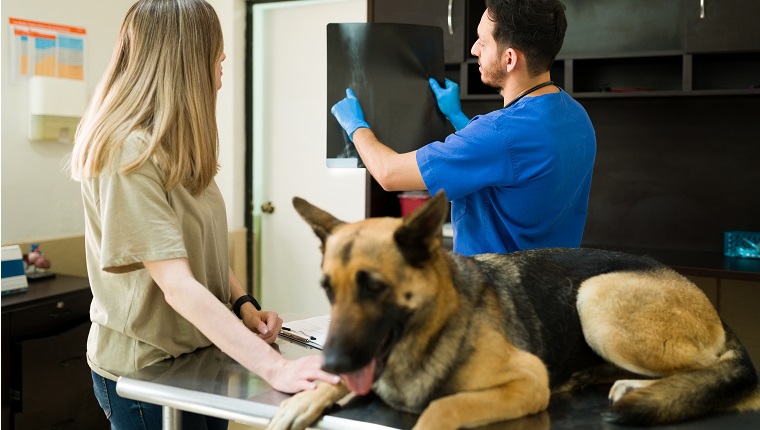Myeloma in dogs is a relatively uncommon bone marrow cancer that occurs when malignant plasma cells accumulate in a dog’s bone marrow.
This cancer develops most frequently in purebred dogs, with German Shepherds particularly at risk. Additionally, dogs aged six and older are more likely to develop this condition than younger pups.
If you see signs that your dog might be suffering from bone marrow cancer, then you must consult your veterinarian for a proper diagnosis and course of treatment. Here’s what you should know about the symptoms, causes, and treatments of myeloma in dogs.
Symptoms Of Myeloma In Dogs
Myeloma in dogs can present a range of symptoms depending on where it develops and the severity of the condition. Some of the most common symptoms include:
- Acting weak and seeming lethargic
- Fever
- Difficulties breathing
- Detached retina
- Feeling pain in the bones
- Gums turning pale
- Bleeding frequently and excessively
- Glaucoma
Causes Of Myeloma In Dogs

The precise cause of myeloma in dogs is unknown. In some cases, it has been speculated that exposure to toxic chemicals, including cigarette smoke, can contribute to the development of the condition.
In general, older dogs aged between six and 13 years of age are more likely to develop this type of cancer than younger dogs. Additionally, purebred dogs, particularly German Shepherds, seem to suffer from it more often than mixed breed dogs.
Veterinary Treatments
If you think that your dog might be developing myeloma, you can expect your veterinarian to ask a series of questions that focus on your canine’s medical history and their lifestyle. Additionally, the vet will place special focus on examining the eyes when evaluating a potential case.
The vet will carry out blood and urine tests with the intention of ruling out other medical conditions that may cause similar symptoms. They can also use X-rays and ultrasound imaging to detect cases of bone marrow cancer.
When it comes to treatment, some cases will require a spell of hospitalization so that dogs can undergo a blood cleansing process. Vets also commonly use radiation therapy on affected areas of the body.
Antibiotics can target any infections that might be present in the body due to the cancer. As ever, if your vet prescribes your dog any medicine, it is vital that you stick to the precise dosage and frequency instructions, along with completing the full course of medication.
After undergoing any medical procedures in a hospital setting, it is important that your dog keeps up regular visits to their vet, along with carrying out frequent blood tests.
Has your dog developed myeloma? How is your vet treating your dog? Tell us all about it in the comments below.










